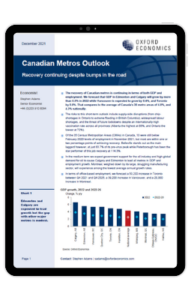Research Briefing
| Dec 21, 2021
Canadian recovery continuing despite bumps in the road

The recovery of Canadian metros is continuing in terms of both GDP and employment. We forecast that GDP in Edmonton and Calgary will grow by more than 5.5% in 2022 while Vancouver is expected to grow by 5.4%, and Toronto by 5.0%. That compares to the average of Canada’s 35 metro areas of 4.8%, and 4.3% nationally..
What you will learn:
- The risks to this short-term outlook include supply-side disruptions (from chip-shortages in Ontario to extreme flooding in British Columbia), widespread labour shortages, and the threat of future lockdowns despite an internationally-high vaccination rate across all provinces (Alberta the highest at 86%, and Ontario the lowest at 72%).
- Of the 35 Census Metropolitan Areas (CMAs) in Canada, 10 were still below February 2020 levels of employment in November 2021, but most are within one or two percentage points of achieving recovery. Belleville stands out as the main laggard however, at just 83.7% of its pre-virus peak while Peterborough has been the star performer of this job recovery at 114.3%.
- In the medium term we expect government support for the oil industry and high global demand for oil to cause Calgary and Edmonton to lead all metros in GDP and employment growth. Montreal, weighed down by its large, struggling manufacturing sector, will experience among the lowest average annual growth rates.
Tags:
Related Services

Post
US Key Themes 2026: Exceptionalism amid fragmentation
US exceptionalism is alive and well, and that won't change in 2026.
Find Out More
Post
Global Key themes 2026: Bullish on US despite AI bubble fears
We anticipate another year of broadly steady and unexceptional global GDP growth, but with some more interesting stories running below the surface.
Find Out More[autopilot_shortcode]
